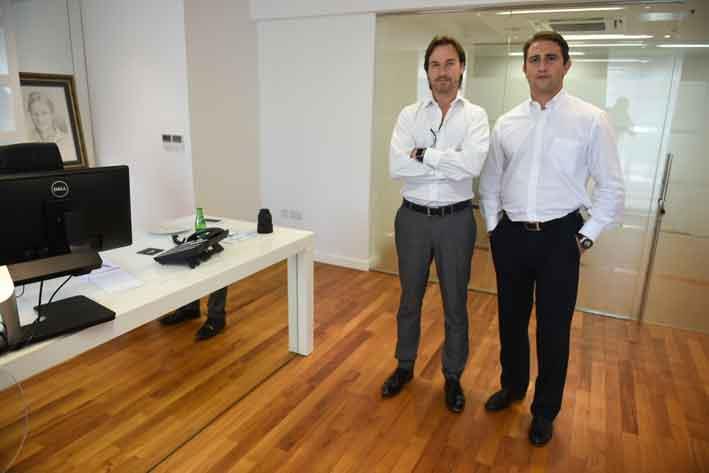How would you define Blockchain technology?
Using just two words, the most suitable definition is digitized trust. It is also the most relevant definition today since we seem to live in a time when counterparties trust each other less and less and the trust gap needs to be bridged. From a scientific viewpoint, Blockchain is a technology that creates an incorruptible digital ledger of economic transactions that can be programmed to record not just financial transactions but virtually everything of value including contracts. In our opinion, distributed ledger technologies really have the potential to revolutionize most industries in the very near future.
What are its main advantages and what problems/issues do you see in the local application of Blockchain technology?
One of the main advantages of Blockchain is that it enables any two parties to make an exchange without the oversight or intermediation of a third party, strongly reducing or even eliminating counterparty risk. This means that the users are in control of all their information and transactions. Furthermore, when using Blockchain one can claim that data is complete, consistent, timely, accurate, and widely available. Moreover, due to the decentralized networks, Blockchain does not have a central point of failure and is better able to withstand malicious attacks. This adds a layer of transparency and immutability because changes to public Blockchains are publicly viewable by all parties creating transparency, and all transactions are immutable, and cannot be altered or deleted. One of the disadvantages is that it is a nascent technology and resolving issues such as transaction speed, the verification process, and data limits will be crucial in making Blockchain widely applicable. Having said this, these issues are currently being tackled and there is little doubt they will be resolved.
We can also say that in many jurisdictions Blockchain still has an uncertain regulatory status but here again we believe decision makers realize the benefits of adopting the technology and will act fast to rectify the situation. The government has stated its wish that Malta be at the forefront of fintech and disruptive innovation. Finally, we also have some integration problems, because Blockchain applications offer solutions that require significant changes to, or complete replacement of, existing systems. In order to make the switch, companies must strategize the transition.

Anthony Mamo
Does Malta, being a small market, command a better advantage when it comes to rolling out such technology?
We believe so. We are blessed with great geographical position and with a strong financial system, talent, entrepreneurial spirit and our can-do approach are undeniable. These components can turn our island into a base and a test-bed for new sectors and technologies. Malta has become a centre of excellence with an enviable reputation in many sectors, and not only ones that are ICT related. The formula, so to speak, is already tried and tested and can therefore be replicated in other areas.
Why did you opt to start with a product for the property market? Is it because this market is currently one of the main drivers in the local economy?
Actually no, this is not the reason. We believe it is a mistake to change or substitute existing systems that serve their purpose very well with another technology, in this case Blockchain, unless there is sound and genuine use case, or because a sector is growing. If on the other hand the true strengths of the technology such as trust, transparency, less friction, reduced costs and overall increased efficiency can be applied to be of benefit to all stakeholders then transition makes sense. With LP 01, our first Blockchain application, we have managed to consolidate all the benefits just mentioned for use in this particular area. There are others.

David Schranz
We noticed that you have Abdalla Kablan on board as your technology mentor. What experience does he bring to the table and how crucial is such experience?
We have known Abdalla for a number of years. He is the person who introduced us to the world of Distributed Ledger Technologies, Cryptocurrencies and asset tokenisation around two years ago. He has always been at the forefront of disruptive technology, so much so we remember him developing a high frequency currency trading platform using artificial intelligence maybe five or six years ago. Today, Dr Kablan is a renowned entrepreneur and published academic. His interdisciplinary background in fintech and machine learning has been of paramount importance for his international success, and we are delighted that he has mentored our team academically. Furthermore, his input on our technological vision and strategic direction is one of the main reasons why we managed to build a robust, scalable, and innovative Blockchain solution
How is your product proposition scalable?
Yes, our system is quite scalable and flexible; we focused on building a framework of micro services designed around the Blockchain proposition, which is why we are able to scale vertically in a sector and horizontally in other markets. Furthermore, given our technical team's strong capabilities we are continuously looking at other improvements to the system, for example we plan to use off chain oracles since computing on the Blockchain is expensive and sometimes slow, whenever possible and secure, we move some computations off the chain which will reduce the load on the network nodes, thus increasing scalability. We also plan to implement sharing mechanisms, which reduce the information every node has to store and process, so that the system can process more parallel transactions, thereby increasing scalability.
You obviously have more products lined up. When will these be ready for deployment?
We have been focused on researching, developing and testing LP 01 for the past 18 months. The design process was somewhat difficult because we wanted to ensure that we would be able to scale horizontally within reasonable timeframes. During this time, we also focused on identifying immediate opportunities where DLT could bring tangible benefits to multiple users and the plan is to deploy another two applications at six-month intervals.

What are the main challenges you have met or you might encounter in these first stages of your company’s operations and what prospects do you foresee?
The main challenge is always to find the right team but we count ourselves lucky that we met the right people at the right time, people who share our enthusiasm, vision and passion. From a technical standpoint, making the right decisions in terms of software design and development is always tough, especially when dealing with technology that is still in its infancy and therefore change happens at a rapid pace. Having said that, it is also true that the international Blockchain community is very inclusive and we were able to connect with various people from all over the world who were very eager to exchange thoughts and ideas with us. At the moment, we would rather not focus on prospects but rather concentrate on delivering cutting-edge solutions within the timeframes we have set ourselves.
What can you tell me about your team at Ledger Projects?
The team at Ledger Projects is small but very diverse, and consists of people with very different skillsets and backgrounds. We have managed to attract people who are academics, technologists with a passion for innovation and people with a strong legal background. We are also fortunate enough to be able to involve, from time to time, people with experience in a particular field to explain inefficiencies in their business process and provide feedback to our proposed solutions. This exchange is very valuable since we believe Blockchain will assist and not replace people fulfilling certain roles. We were also the first company to sponsor a Maltese top student to pursue a B.Sc. AI degree. We are also interested in exploring the possibility of using DLT and AI in one application and are keen to work with students who have brilliant ideas and a genuine interest in these areas.
You will be hosting a launch event. Who should attend this event?
On 28th September, we will be launching both Ledger Projects as a company, but more importantly we will present our first 'ready to use' Blockchain application. Ledger Projects is entirely Maltese owned, and the product was developed entirely in Malta, by Maltese people (bar one Italian residing in Malta). The morning event will be held at The Westin Dragonara and people who are interested in the subject, or are somehow involved in cryptocurrency/Blockchain can register their interest by sending an email to [email protected]. Places are limited and requests received will be accepted on a first come first served basis.
What in your opinion should be Malta’s priorities if it truly wants to establish itself as a hub for this technology?
I think the government has a clear vision on where it wants Malta to be in the not too distant future in terms of Blockchain and related areas and steps have already been taken to ensure this happens soon. The important thing in our opinion is to start, as there is already a lot of activity in this field. If we look around us, Sweden is testing a Blockchain-based land registry and Dubai wants distributed ledgers to power its entire government by 2020. Just recently, it was reported that Estonia wants to launch its own virtual currency 'estcoin' via an initial coin offering. We have to believe that Blockchains are not merely a business opportunity, but a way to change how governments serve their citizens and private companies their clients. The main priorities however should be regulation, and incentives to attract the right capital and talent to stimulate growth in this sector.